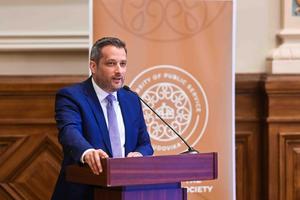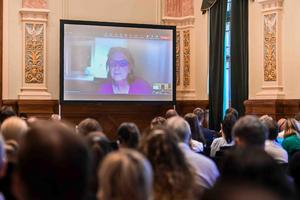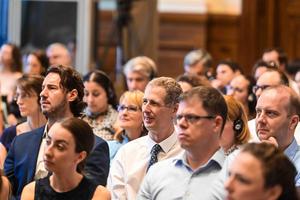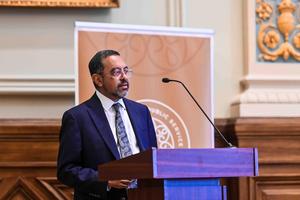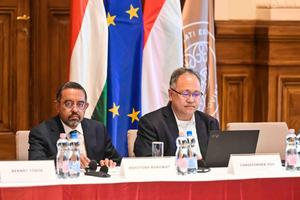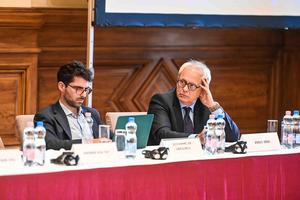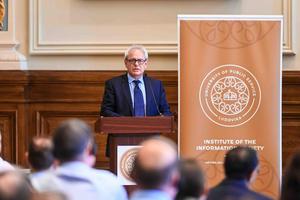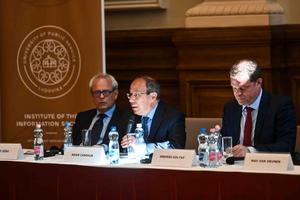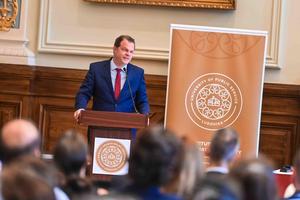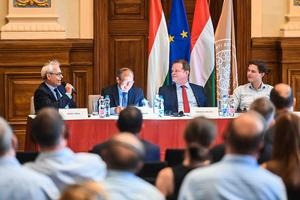A conference on Internet platforms was held for the third time at the Ludovika University of Public Service on 25 June. At the sold-out event Society of Internet Platforms organised by the Eötvös József Research Centre's Institute of the Information Society, renowned speakers from abroad and researchers from the university shared their views on the role of artificial intelligence in the future of the Internet.
The aim of the experts remains to engage in a transatlantic dialogue to develop new platform regulation solutions - stressed Bernát Török in his opening speech. The Director-General of the Eötvös József Research Centre highlighted the impact of new technologies on society. He recalled that Europe supports the regulation of internet platforms. He mentioned as examples the GDPR, the law on digital services, the law on digital markets, and the law on artificial intelligence (AI) regulation that is about to be adopted in the EU. However, he pointed out that the "Brussels effect" is already being felt in the United States.
According to Bernát Török, it is difficult to reconcile the new practical norms with the traditional legal order, and it is also a challenge to apply the new regulations in a way that is adapted to reality, striking the right balance between the social benefits that platforms bring and the social risks they may entail.
Quoting Robert Post, Professor at Yale Law School, one of the speakers at last year's conference, the EJRC Director General pointed out that the internet, by its very size, poses a serious threat to modern democracies. In the opinion of the educator, the internet is too big to be controlled by the exercise of human judgement, he added.
It is important that artificial intelligence has the power to regulate the internet, said Bernát Török, who believes that for this purpose it is necessary to develop a regulation between AI and law. At the same time, he recalled Pope Francis' speech at the G7 summit, in which the head of the Church also stressed the need to strike a balance between new and traditional regulation and the tools of AI.
To make automated decisions, we need to understand automated systems, and to protect the rule of law, we need to work together with IT experts," explained Dutch lawyer and philosopher Mireille Hildebrand in her online presentation. The professor from Radboud University in the Netherlands, who also works in Brussels on the law-technology nexus, stressed the need to develop new legal tools and methodologies to better protect the system of checks and balances and IT technologies. Mireille Hildebrand said it was important to "fill the gap" between the creation of legislation and its practical application. She pointed out that rules can always be interpreted according to the context, and positive law creates a kind of social order. In her view, in order to protect the rule of law, lawyers need to take much more account of subjectivity.
Ashutosh A. Bhagwat, Professor of Law at the UC Davis School of Law in the US, spoke about social media regulation. In his presentation, he discussed how social media has become the primary arena for policy and politics over the past six years, but the technology space is constantly changing, and since 2018, governments in different countries have taken active steps to regulate social media. He pointed out, however, that the complexity of the system makes it difficult to see the framework of the legislation. He drew attention to the dominance of social media, which, in his view, has inundated the world and overwhelmed traditional mediums. As an example, he said that around 50 per cent of the average American now only gets their information from the internet, while in Canada and Australia, regulations are already in progress to stop Facebook from publishing news. The professor also pointed out that social media algorithms generate a lot of disinformation, which greatly influences public discourse, while at the same time, while traditional media do not use aggressive language, online anonymity is possible, and therefore hate speech is regular, for example on the basis of race or gender. He spoke about influencers, whose words can influence the way young people in particular see the world.
Ashutosh A. Bhagwat also spoke about social media regulation, which only started in 2018. The expert recalled that Facebook used to seem to control the whole world because it was spreading very fast, but now the number of users has dropped dramatically because TikTok was launched in 2017, and the latter has already been banned in several countries. Regarding the legislation, the professor said that lawmakers cannot foresee how technical progress will evolve in 3-5 years, as it takes that long to introduce a law.
Zsolt Ződi, Senior Research Fellow at the EJRC IIS, gave his thoughts on whether the code overrides the law. He recalled that with the emergence of the internet, technology has become a tool for regulating behaviour and turning off human action. He stressed that law is shaped by social forces other than technology, and also spoke about the importance of different regulations. He pointed out that today the state is increasingly regulating certain aspects of life in order to prevent crises, disasters, accidents and epidemics. He described platforms as ecosystems that are a combination of data, algorithms and users. He confirmed that our behaviour is heavily influenced by algorithms, but in his view traditional law is "not dying".
The conference also discussed the regulatory models of the AI Act, the development of platform competition and digital constitutionalism, the relationship between AI and the use of the internet knowledge base, and the protection of media freedom.
"We do not yet know the effects of the European Union's regulation on online platforms, so thinking about European law is like shooting at a moving target" - András Koltay said in his closing remarks that everything is constantly changing in this area. The President of the National Media and Infocommunications Authority (NMHH) said that the rights of all actors in the digital space must be protected, including users and the companies providing the technology. András Koltay expressed his hope that traditional media will survive the world of online platforms. He also spoke about the impact of accelerated technologies, pointing out that if we rely on algorithms or artificial intelligence to make decisions, given their speed, it is impossible to solve all problems with legislation.
The NMHH President pointed out that new platforms raise new problems and require different regulations in different continents, but none of them can be definitive. In his opinion, the regulatory basis in Europe is stronger than in the United States, but these issues need to be revisited in Europe as well, as no definitive answers have been found yet.
Text: Réka Zsuzsanna Szabó
Photo: Dénes Szilágyi


